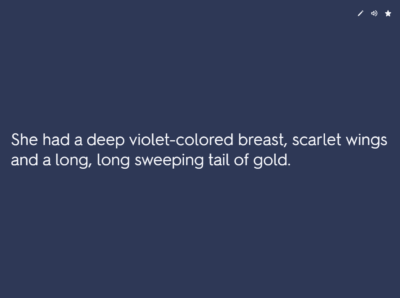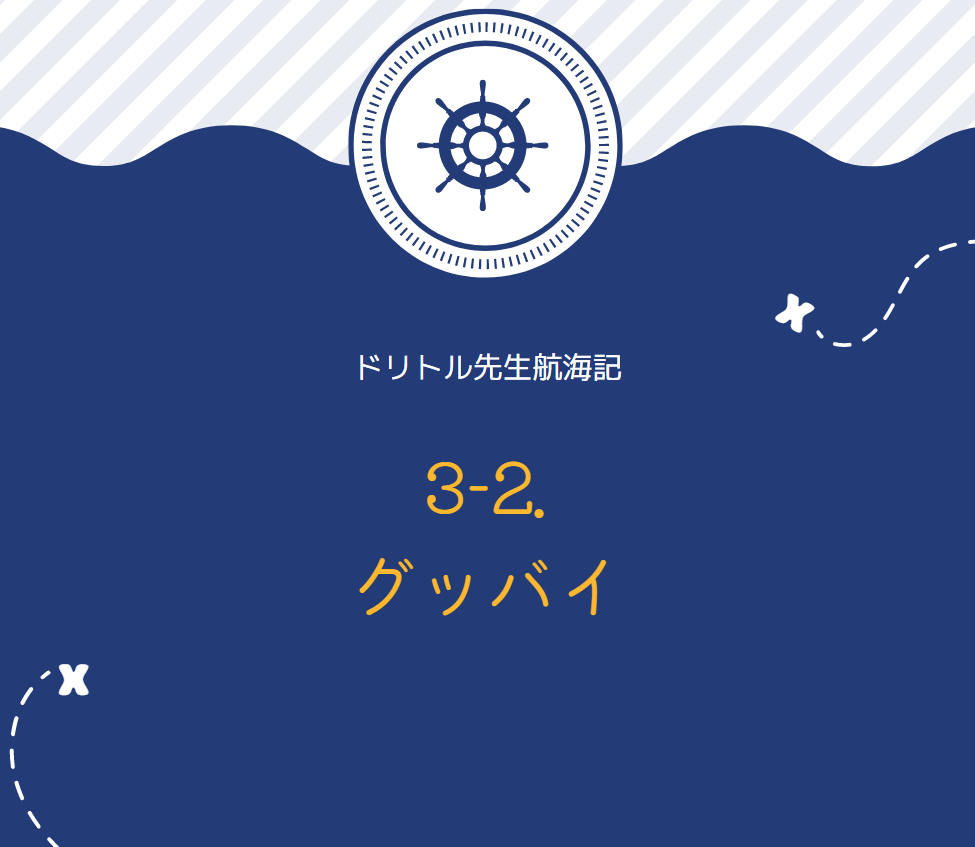『ドリトル先生航海記』 英文/和訳 【3-2.グッバイ】
※カラフル対訳で紹介している作品はすべてパブリックドメインです。
このサイトで使われている作品のすべては著作権の切れた名作などの全文を電子化して、インターネット上で公開しているProject Gutenberg(プロジェクト・グーテンベルク)、LibriVox(リブリヴォックス、朗読図書館)の作品を出典としています。
翻訳者:satoyayo4080
TWO days after that we had all in readiness for[~の準備を整えて] our departure.
二日後には出発の準備が整った。
On this voyage Jip begged so hard to be taken that the Doctor finally gave in[屈服する, 降参する] and said he could come.
ジップがこの航海に連れて行ってほしいとしきりにせがむので、先生もついに折れて行けることになった。
Polynesia and Chee-Chee were the only other animals to go with us.
他に一緒に行く動物はポリネシアとチーチーだけだった。
Dab-Dab was left in charge of[~を~に託す] the house and the animal family we were to leave behind.[置き去りにする]
私たちが留守の間はダブダブが家と残された動物の世話をすることになった。
Of course, as is always the way, at the last moment we kept remembering things we had forgotten;
もちろん、いつものことではあるけど、土壇場になって忘れものを思い出してばかりいた。
and when we finally closed the house up and went down the steps to the road, we were all burdened with armfuls of odd[雑多な] packages.
だから、最後に家を閉め階段を降りて道路に出た時は、全員が腕いっぱいにいろいろな荷物を抱えていた。
Halfway to the river, the Doctor suddenly remembered that he had left the stock-pot[煮だし用の鍋] boiling[煮え立つ] on the kitchen-fire.
川に向かっている途中で、先生が突然台所のスープの鍋の火をつけっぱなしにしてあったのを思い出した。
However, we saw a blackbird flying by who nested in our garden, and the Doctor asked her to go back for us and tell Dab-Dab about it.
でも、先生の庭に巣を作っているクロウタドリが飛んでいるのを見ると、先生はその鳥に家に戻ってダブダブに伝えてくれるよう頼んだ。
Down at the river-wall[防波護岸] we found a great crowd waiting to see us off.
堤防では、大勢の人たちが私たちを見送るために待っていた。
Standing right near the gang-plank were my mother and father.
渡り板 のすぐそばに立っていたのは、父と母だった。
のすぐそばに立っていたのは、父と母だった。
I hoped that they would not make a scene,[大騒ぎする] or burst into tears or anything like that. [~とかそういったこと]
私はふたりが騒いだり、泣きだしたりしないように願った。
But as a matter of fact they behaved quite well—for parents. My mother said something about being sure not to[~してはいけない] get my feet wet;
でも実際のところ、ふたりは(子どもを見送る)親として非常に行儀よくしていた。母は足を濡らさないようにというようなことを言った。
and my father just smiled a crooked sort of smile, patted me on the back and wished me luck.
そして父はゆがんだような笑みを浮かべて私の背中を軽くたたき、「幸運を祈る」と言ってくれた。
Good-byes are awfully uncomfortable[心地よくない] things and I was glad when it was over and we passed on to the ship.
お別れというのはとても気づまりなものなので、それが終わって船に乗り込んだ時はほっとした。
We were a little surprised not to see Matthew Mugg among the crowd. We had felt sure that he would be there;
人ごみの中にマシュー・マグの姿がなかったのには少し驚いた。彼はきっと来てくれるだろうと思っていたからだ。
and the Doctor had intended to[~するつもりでいた] give him some extra instructions[追加の指示] about the food for the animals we had left at the house.
先生は家に残してきた動物たちの食べものについて、彼にもう少しお願いをするつもりだった。
At last, after much pulling[引っぱる] and tugging,[ぐいと引く] we got the anchor up and undid a lot of mooring-ropes.
とうとう、何度もぐいぐいと引っ張って錨を上げ、たくさんの係留索 をほどいた。
をほどいた。
Then the Curlew began to move gently down the river with the out-running tide, while the people on the wall cheered and waved their handkerchiefs.
すると、波止場[壁]にいる人たちが歓声をあげたりハンカチを振ったりするなか、カール丸[ダイシャクシギ号]は追い潮に乗って穏やかに川を流れ始めた。
We bumped into one or two other boats getting out into the stream; and at one sharp bend in the river we got stuck[ぬかるみにはまり込む] on a mud bank[泥の浅瀬] for a few minutes.
流れに乗ろうとしたところで、他の1,2艘の船にドンとぶつかってしまい、また、ある川の急カーブの所では数分間、浅瀬のぬかるみにはまり込んでしまった。
But though the people on the shore seemed to get very excited at these things, the Doctor did not appear to be disturbed[かき乱された] by them in the least.
しかし、岸辺の人たちはそのことにとても興奮しているようだったが、先生はまったく気にしていないようだった。
“These little accidents will happen in the most carefully regulated[細心の注意を払う] voyages,”
「こういった小さな事故は、どんなに注意深く船を進ませても起こるものさ」
he said as he leaned over the side and fished for[釣る,取る] his boots which had got stuck[取れなくなる] in the mud while we were pushing off.
と先生は船の横から身を乗り出し、押し出した時に泥にはまったブーツを取りながら言った。
“Sailing is much easier when you get out into the open sea.[公海, 外洋] There aren’t so many silly things to bump into.”
「広い海に出れば航海はずっと楽になる。ぶつかるような馬鹿げたものはあまりないからな」
For me indeed it was a great and wonderful feeling, that getting out into the open sea,
大海原に出ることは、ほんとうに素晴らしい気分だった。
when at length[ついに, ようやく] we passed the little lighthouse at the mouth of the river and found ourselves free of the land.
とうとう、河口の小さな灯台を過ぎ、陸地から離れたことが分かった。
It was all so new and different:[変わった,独特の] just the sky above you and sea below.
何もかもが新鮮で珍しかった。頭の上には空、下には海があるだけだった。
This ship, which was to be our house and our street, our home and our garden, for so many days to come, seemed so tiny in all this wide water—so tiny and yet so snug, sufficient,[十分で] safe.
この船は、この先何日も、我々の家であり、道であり、庭になるのだが、この広い海の中ではとても小さく感じられた。だが小さいけれども、とても居心地が良く、なに不自由なく、安全だった。
I looked around me and took in a deep breath.
私は周囲を見渡し、深呼吸をした。
The Doctor was at the wheel steering[船の操舵輪] the boat which was now leaping[跳ぶ] and plunging[突っ込む] gently through the waves.
先生は船の舵を取り、船は波の中を穏やかに揺られていった。
(I had expected to feel seasick at first but was delighted to find that I didn’t.) Bumpo had been told off[割り当てる] to go downstairs and prepare dinner for us.
(最初は船酔いするかと思っていたのたが、そうでもなかったので嬉しかった)バンポは下に降りて夕食の準備をするように言われた。
Chee-Chee was coiling up ropes in the stern and laying them in neat piles.
チーチーは船尾でロープを巻いて、きれいな束にして積み重ねていた。
My work was fastening down the things on the deck so that nothing could roll about if the weather should grow rough when we got further from the land.
私の仕事は、船が陸地からもっと離れたとき、天候が荒れても転が【る】らないように、甲板にある物を固定することだった。
Jip was up in the peak of the boat with ears cocked and nose stuck out—
ジップは船の船首に上がって耳をピンと立て、鼻を突き出しー
like a statue, so still—his keen old eyes keeping a sharp look-out for[~をよく見張る] floating wrecks, sand-bars, and other dangers.
まるで銅像のようにじっとーその鋭敏で熟練した目は、浮遊する難破船や砂州などの危険がないかをするどく目をこらしていた。
Each one of us had some special job to do, part of the proper[適切な, ふさわしい] running of[~の運転] a ship.
一人一人がそれぞれ特別な仕事をしていて、船の運航に必要な役割を持っていた。
Even old Polynesia was taking the sea’s temperature with the Doctor’s bath-thermometer tied on the end of a string, to make sure there were no icebergs near us.
年老いたポリネシアでさえ氷山が近くにないかを確認するため、先生のお風呂用温度計を紐の先に着けて海の温度を測っていた。
As I listened to her swearing[ののしり, 悪たれ口] softly to herself because she couldn’t read the pesky[やっかいな] figures[数字] in the fading[衰える, しぼむ] light,
だが、暗くなって数字が読みづらいとそっとひとりで悪態をついているのが聞こえた。
I realized[はっきり理解する, 悟る] that the voyage had begun in earnest and that very soon it would be night—my first night at sea!
航海が本格的に始まって、もうすぐ夜になると感じた。海での最初の夜だ!
対訳を使った瞬間英作文の練習
和訳を使った瞬間英作文の練習には①スマホでスクロールを上手に活用して和訳と英文を交互に見るか、②パソコンの場合なら下記のクイズレットの単語カードを利用する、のが便利です。模範解答である英文を見ることでよりネィティブに近い表現力を身につけることができます。



